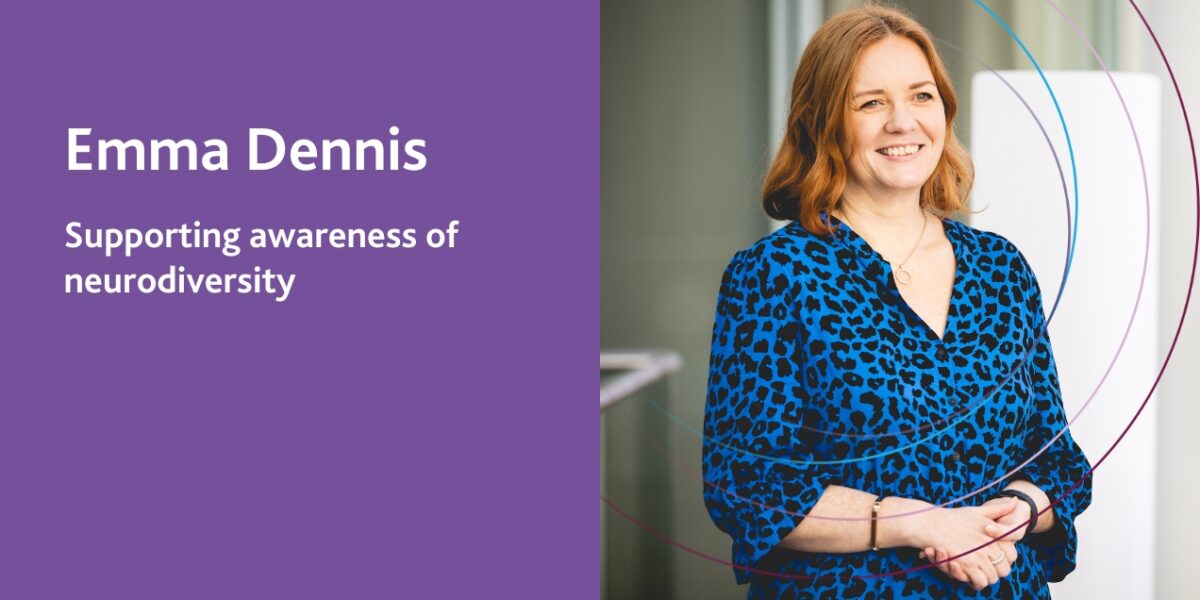|
Getting your Trinity Audio player ready...
|
In prioritising work around diversity, equality and inclusion as one part of our ESG Strategy, neurodiversity has become an increasing area of focus. Neurodiversity is often a ‘catch-all’ term used to describe a range of neurodiverse conditions and, more broadly, recognises the different ways our individual brains work and process information. Understanding neurodiversity is important to better understand different ways of working and to harness our individual strengths and talents as we work together.
In this next blog in our ‘sustainability allies’ series, DE&I and Wellbeing Senior Manager Emma Dennis discusses the work being done to aid awareness of neurodiversity in our workplace and to share insight and experiences.
To find out more about our ESG initiatives, take a look at our Sustainability report 2024.
Your name and position at Gowling WLG:
Emma Dennis, DE&I and Wellbeing Senior Manager at Gowling WLG.
What is your role at Gowling WLG?
I am a Senior Manager in the firms DE&I and Wellbeing team and my role focuses on what the firm, and our people, can do to harness the power of diverse perspectives, manage wellbeing and be an inclusive and great place to work. I’m also a Wellbeing Champion and Domestic Abuse Champion and offer a listening and signposting service to our people that may be experiencing wellbeing concerns of enduring domestic abuse.
When did you begin to focus more on neurodiversity as part of the firm’s DE&I programmes?
Increased awareness about neurodiversity has prompted many organisations to start to focus on this area more over the last couple of years.
My own diagnosis of ADHD in 2024, and my daughter and niece’s neurodiversity, led me to get a better understanding of this area and made me want to ensure that workplaces were educated and supportive. This isn’t only important for children who will be employees one day, but also for people like me who have been diagnosed later in life and are now on a journey of understanding themselves and their needs more.
As a firm we started to focus more heavily on this area of work in 2023, as we recognised that more people were being late diagnosed and that there was a general lack of awareness about what neurodiversity is and, importantly, the strengths that neurodivergent people bring to the workplace. So much of what you used to read in the press or online about this subject focused on the things neurodivergent people might struggle with, and not enough focused on the strengths and skills they bring and which are hugely important in any workplace.
We understood that we needed to do more to ensure we were supporting our people and future proofing.
Tell us about the neurodiversity campaign you have helped to develop and launch…
Our initial aims were relatively simple, to raise awareness of neurodivergence and to look at our recruitment and adjustments processes and how we could improve these.
A key element of raising awareness was bringing to life the neurodivergent experience and utilising role models to do this. We started this by holding a session during our Festival of Learning event, where we shared the strengths and challenges associated with various conditions and also shared stories from our people to bring it all to life. We had two Partners who were very open about their ADHD and we utilised their stories to break down misconceptions around what you can achieve in your careers.
This initial session was then also run within a number of our teams to allow for conversation and discussion on the topic. The most powerful aspect was the storytelling piece, as this helped to break down misconceptions and provide real life examples for people. We also collaborated with some clients to run additional sessions and events.
As part of Neurodiversity Celebration Week, we released our Different Minds brochure which distilled this learning into a format that could be consumed as and when. This brochure also featured new stories from our people from the perspective of those who are neurodivergent, but also those who have neurodivergent children. We recognised the unique challenges parents were experiencing in managing work and home and wanted to ensure we reflected this.
We also wanted to ensure we had a way to connect people with similar experiences across the firm. Therefore, we ran our first ADHD coffee mornings, with the aim of bringing people together to share stories and support each other. These were hugely successful and the peer-to-peer learning and support has been priceless.
Part of our work has also included looking at our processes around recruitment and adjustments. While we still have work to do in this area, we have made positive strides in ensuring our recruitment team understand the types of adjustments neurodivergent candidates might need and have processes in place to support hiring managers. We’ve also looked at our reasonable adjustments process and offering to ensure that we can give the right support to neurodivergent people in the workplace.
What have been some of the challenges and the biggest achievements?
One of the biggest challenges has been on a more practical level of ensuring processes work for neurodivergent individuals. We have had to have conversations with third party providers to give feedback on how their processes don’t work for everyone. For example, for someone with ADHD having to fill out multiple long forms can be a struggle. So we raise these issues with our providers to ensure that they can look to change/flex their processes.
Another challenge has been encouraging people to be open about their own neurodivergence. We’ve seen a lot of positive change in this area, as we have senior people who have shared their stories, and this has in turn empowered others to be more open and to ask for help. It can be hard as a neurodivergent person to ask for additional support. Often it involves talking about the things you aren’t as good at, and for anyone this can be a scary thing to do as you worry about the potential impact. However, getting the support you need can have a positive impact on your experience in work.
Breaking down misconceptions and sharing insights has seen more and more people be open about their experience and it’s great to see that this is a topic of conversation now at the firm and something that brings people together.
I would say that the openness about neurodivergence is our biggest achievement; particularly when I look back to less than 18 months ago, when it wasn’t a topic that was really discussed and I wouldn’t have been able to name one senior person who was neurodivergent. To see the change that’s happened in this short time is amazing.
What are common misconceptions around neurodiversity?
I think one of the biggest misconceptions is that people think that they understand neurodivergence when they don’t. There is a great quote that says: “If you’ve met one person with autism, then you’ve met one person with autism” and this goes for every neurodivergent condition. Everyone’s experience will be completely different – with each individual finding different things challenging and, similarly, finding different things as strengths.
The biggest mistake anyone could make would be to put limits on anyone, without really understanding their experience. Too often we see stereotypical versions of autism or ADHD, for example, and that can unfortunately impact on what we “expect” from people with these conditions.
My experience of ADHD has several areas that I struggle with, however this doesn’t impact on my ability to do my job, I just know what tools/resources/aids/processes I need in place to mitigate this. What’s helpful, particularly when being late diagnosed, is workplaces providing the right support to help individuals understand themselves and what will help them either via workplace assessments or coaching.
What are you most proud of from your work in this area?
I’m most proud of the difference 18 months has made to the conversations we are having in the workplace around this topic. To see the experiences and knowledge our people are sharing and the support they are offering each other, as well as that the firm is offering, is really powerful. The work we are doing is having a positive impact on the experiences of our people at all stages in their careers; from those applying to us, through to colleagues who have been at the firm for years.
Can you share examples of how the campaign has positively impacted people?
This campaign has impacted people in a number of ways:
- it’s led to more people seeking out diagnosis;
- it’s given people permission to ask for support, should they need it; and
- it’s also led to a much wider understanding of neurodivergence and the ability for our people to see the skillsets that might, until now, have been dismissed due to lack of understanding.
From my personal perspective I started this campaign undiagnosed and it led to my diagnosis of ADHD which has been lifechanging for me. Understanding myself more, not berating myself for things I found difficult and practical things like getting a new chair and desk have changed my work experience massively. It comes down to everything we are trying to achieve with our wider DE&I work – that we want people to be themselves and succeed at the firm. Masking your neurodivergence (or not realising it’s there) takes so much effort and energy. Getting support and not having to mask really does free you up to achieve more in your career.
What’s next as part of the campaign?
We are going to continue the great work we’ve been doing so far with more coffee mornings, awareness raising and storytelling. We also plan to set up ways for our neurodivergent people and parents of neurodivergent children to connect informally to share resources and ask questions.
We also want to focus on what more we need to do from a process perspective to ensure that we are inclusive to neurodivergent talent. To do this we will be partnering with an external provider to complete an assessment that covers a range of business areas and will give us a blueprint for future activity.
Where can people go to find out more and access further resources?
Our people can visit the neurodiversity hub on our intranet that brings together resources, best practice and information from a wide range of sources. It’s home to our Different Minds brochure and lots of stories from our people about their insight and experience of neurodivergence.
Externally, there are many different resources for people to access information about neurodivergent conditions, where to get support and how to go through the diagnosis process. Places like the National Autistic Society are fantastic and there are also other organisations focused on a wider range of conditions. I also find tapping specific questions about neurodivergence into a search engine helpful in seeing ideas from other people on how they manage similar issues. In a professional setting, there is also the Legal Neurodiversity Network that was set up last year and is really useful to law firms exploring what they can do to increase neurodivergent inclusion, and I’d highly recommend people look it up and join.
About the author(s)
Emma Dennis is the DE&I and Wellbeing Senior Manager at Gowling WLG (UK).

